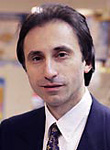Breakthrough may lead to abundant adult stem cells for bone marrow transplants

In a leap toward making stem cell therapy widely available, researchers at the Ansary Stem Cell Institute at Weill Cornell Medical College (WCMC) have discovered that endothelial cells, the most basic building blocks of the vascular system, produce growth factors that can grow copious amounts of adult stem cells and their progeny over the course of weeks.
The finding will likely revolutionize the use of adult stem cells for bone marrow transplants, organ regeneration, and therapies for hearts, brains, skin and lungs, say the researchers.
Until now, adult stem cell cultures would die within four or five days despite best efforts to grow them.
"This is groundbreaking research with potential application for regeneration of organs and inhibition of cancer cell growth," said Dr. Antonio M. Gotto Jr., the Stephen and Suzanne Weiss Dean of WCMC and provost for medical affairs of Cornell.
This new finding sets forth the innovative concept that blood vessels are not just passive conduits to deliver oxygen and nutrients, but are also programmed to maintain and proliferate stem cells and their mature forms in adult organs. Using a novel approach to harness the potential of endothelial cells by "co-culturing" them with stem cells, the researchers discovered how to manufacture an unlimited supply of blood-related stem cells that may eventually ensure that anyone who needs a bone marrow transplant can get one.
The vascular-cell model established in this study could also be used to grow abundant functional stem cells from other organs, such as the brain, heart, skin and lungs.
The findings are published in the March 5 issue of the journal Cell Stem Cell.
In adults, organs have few naturally occurring stem cells, so using them for organ regeneration is impractical. Until now, strategies to expand cultures of adult stem cells, which invariably used animal-based growth factors, serum and genetically manipulated feeder cells, have only been marginally successful. This study, however, uses endothelial cells to propagate stem cells without added growth factors and serum.
"This study will have a major impact on the treatment of any blood-related disorder that requires a stem cell transplant," says senior author, Dr. Shahin Rafii, the Arthur B. Belfer Professor in Genetic Medicine and co-director of the Ansary Stem Cell Institute at WCMC.
Currently, stem cells derived from bone marrow or umbilical cord blood are used to treat patients who require bone marrow transplants. Most stem cell transplants are successful, but because of the shortage of genetically matched bone marrow and umbilical cord blood cells, many patients cannot benefit from the procedure.
If this vascular-based stem cell expansion strategy continues to be validated, physicians could use any source of hematopoietic (blood-producing) stem cells, propagate them exponentially, and bank the cells for transplantation into patients, he said.
In a related study, researchers also discovered that endothelial cells not only could expand stem cells, but also instruct stem cells to generate mature differentiated progeny that could form immune cells, platelets, and red and white blood cells, all of which constitute functioning blood.
The "findings suggest that endothelial cells directly, through expression of stem-cell-active cytokines, promote stem cell reconstitution," said first author Dr. Jason Butler, a senior investigator at WCMC.
Media Contact
Get Cornell news delivered right to your inbox.
Subscribe